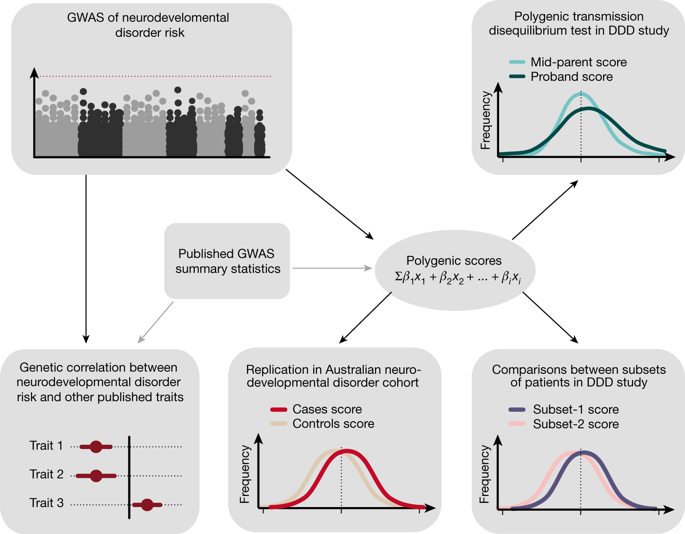Our official English website, www.x-mol.net, welcomes your
feedback! (Note: you will need to create a separate account there.)
Common genetic variants contribute to risk of rare severe neurodevelopmental disorders
Nature ( IF 50.5 ) Pub Date : 2018-09-26 , DOI: 10.1038/s41586-018-0566-4 Mari E K Niemi 1 , Hilary C Martin 1 , Daniel L Rice 1 , Giuseppe Gallone 1 , Scott Gordon 2 , Martin Kelemen 1 , Kerrie McAloney 2 , Jeremy McRae 1 , Elizabeth J Radford 1, 3 , Sui Yu 4 , Jozef Gecz 5, 6 , Nicholas G Martin 2 , Caroline F Wright 7 , David R Fitzpatrick 8 , Helen V Firth 1, 9 , Matthew E Hurles 1 , Jeffrey C Barrett 1
Nature ( IF 50.5 ) Pub Date : 2018-09-26 , DOI: 10.1038/s41586-018-0566-4 Mari E K Niemi 1 , Hilary C Martin 1 , Daniel L Rice 1 , Giuseppe Gallone 1 , Scott Gordon 2 , Martin Kelemen 1 , Kerrie McAloney 2 , Jeremy McRae 1 , Elizabeth J Radford 1, 3 , Sui Yu 4 , Jozef Gecz 5, 6 , Nicholas G Martin 2 , Caroline F Wright 7 , David R Fitzpatrick 8 , Helen V Firth 1, 9 , Matthew E Hurles 1 , Jeffrey C Barrett 1
Affiliation

|
There are thousands of rare human disorders that are caused by single deleterious, protein-coding genetic variants1. However, patients with the same genetic defect can have different clinical presentations2–4, and some individuals who carry known disease-causing variants can appear unaffected5. Here, to understand what explains these differences, we study a cohort of 6,987 children assessed by clinical geneticists to have severe neurodevelopmental disorders such as global developmental delay and autism, often in combination with abnormalities of other organ systems. Although the genetic causes of these neurodevelopmental disorders are expected to be almost entirely monogenic, we show that 7.7% of variance in risk is attributable to inherited common genetic variation. We replicated this genome-wide common variant burden by showing, in an independent sample of 728 trios (comprising a child plus both parents) from the same cohort, that this burden is over-transmitted from parents to children with neurodevelopmental disorders. Our common-variant signal is significantly positively correlated with genetic predisposition to lower educational attainment, decreased intelligence and risk of schizophrenia. We found that common-variant risk was not significantly different between individuals with and without a known protein-coding diagnostic variant, which suggests that common-variant risk affects patients both with and without a monogenic diagnosis. In addition, previously published common-variant scores for autism, height, birth weight and intracranial volume were all correlated with these traits within our cohort, which suggests that phenotypic expression in individuals with monogenic disorders is affected by the same variants as in the general population. Our results demonstrate that common genetic variation affects both overall risk and clinical presentation in neurodevelopmental disorders that are typically considered to be monogenic.A genome-wide association study of approximately 7,000 patients with neurodevelopmental disorders demonstrates that overall risk and clinical presentation in putative monogenic disorders is also influenced by common genetic variants present in the general population.
中文翻译:

常见的遗传变异导致罕见的严重神经发育障碍的风险
有数千种罕见的人类疾病是由单一有害的蛋白质编码基因变异引起的。然而,具有相同遗传缺陷的患者可能有不同的临床表现2-4,一些携带已知致病变异的个体可能看起来不受影响5。在这里,为了了解这些差异的原因,我们研究了一组由临床遗传学家评估的 6,987 名儿童,这些儿童患有严重的神经发育障碍,例如全球发育迟缓和自闭症,通常与其他器官系统的异常相结合。尽管这些神经发育障碍的遗传原因预计几乎完全是单基因的,但我们发现 7.7% 的风险差异可归因于遗传的常见遗传变异。我们通过展示复制了这种全基因组的常见变异负担,在来自同一队列的 728 个三人组(包括一个孩子和父母双方)的独立样本中,这种负担从父母过度传递给患有神经发育障碍的儿童。我们的共同变异信号与降低受教育程度、智力下降和精神分裂症风险的遗传易感性显着正相关。我们发现,具有和不具有已知蛋白质编码诊断变异的个体之间的共同变异风险没有显着差异,这表明共同变异风险会影响具有和不具有单基因诊断的患者。此外,先前发表的自闭症、身高、出生体重和颅内体积的共同变量评分都与我们队列中的这些特征相关,这表明单基因疾病个体的表型表达受到与普通人群相同的变异的影响。我们的研究结果表明,常见的遗传变异会影响通常被认为是单基因的神经发育障碍的总体风险和临床表现。一项对大约 7,000 名神经发育障碍患者的全基因组关联研究表明,推定的单基因疾病的总体风险和临床表现是也受到一般人群中常见的遗传变异的影响。
更新日期:2018-09-26
中文翻译:

常见的遗传变异导致罕见的严重神经发育障碍的风险
有数千种罕见的人类疾病是由单一有害的蛋白质编码基因变异引起的。然而,具有相同遗传缺陷的患者可能有不同的临床表现2-4,一些携带已知致病变异的个体可能看起来不受影响5。在这里,为了了解这些差异的原因,我们研究了一组由临床遗传学家评估的 6,987 名儿童,这些儿童患有严重的神经发育障碍,例如全球发育迟缓和自闭症,通常与其他器官系统的异常相结合。尽管这些神经发育障碍的遗传原因预计几乎完全是单基因的,但我们发现 7.7% 的风险差异可归因于遗传的常见遗传变异。我们通过展示复制了这种全基因组的常见变异负担,在来自同一队列的 728 个三人组(包括一个孩子和父母双方)的独立样本中,这种负担从父母过度传递给患有神经发育障碍的儿童。我们的共同变异信号与降低受教育程度、智力下降和精神分裂症风险的遗传易感性显着正相关。我们发现,具有和不具有已知蛋白质编码诊断变异的个体之间的共同变异风险没有显着差异,这表明共同变异风险会影响具有和不具有单基因诊断的患者。此外,先前发表的自闭症、身高、出生体重和颅内体积的共同变量评分都与我们队列中的这些特征相关,这表明单基因疾病个体的表型表达受到与普通人群相同的变异的影响。我们的研究结果表明,常见的遗传变异会影响通常被认为是单基因的神经发育障碍的总体风险和临床表现。一项对大约 7,000 名神经发育障碍患者的全基因组关联研究表明,推定的单基因疾病的总体风险和临床表现是也受到一般人群中常见的遗传变异的影响。











































 京公网安备 11010802027423号
京公网安备 11010802027423号